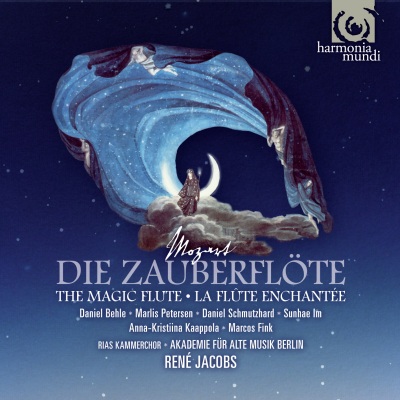
Mozart: Die Zauberflöte
It’s a much-abused term, but for once nothing else will do: René Jacobs’s new recording of Die Zauberflöte (The Magic Flute) really is a revelation. The opera’s unique blend of high art and popular entertainment – combining a paean to Enlightenment values with romance and earthy comedy – is not easy to pin down, but Jacobs’s theatrical flair ensures a triumphant success. If you think you know Zauberflöte, think again: Jacobs brings it to life like never before. One of the set’s greatest strengths is the vibrancy of its spoken dialogue (complete). Avoiding po-faced recitation, Jacobs encourages his cast to give colourful performances in 18th century Viennese style. Many of the Three Ladies’ lines are even delivered in sing-song declamations: the musical cries of "Sie kommt!" which herald the Queen of the Night’s arrival are marvellously hysterical. Scenes are further enlivened by stylishly improvised fortepiano accompaniments (Mozart himself directed the first performances from the keyboard) and a wind machine and array of thunder-boards help create a wonderfully homogenous atmosphere. With a generally youthful cast boasting some lovely voices, the music is equally captivating. Jacobs is all about excitement and making the most of orchestral detail: the breakneck overture only manages to stay on the rails thanks to stunning playing from the Akademie für Alte Musik Berlin; the ferocious sturm und drang of the opening number is spine-tingling. There’s sensitivity too, in the heartrending arias for Pamina (Marlis Petersen) and Tamino (Daniel Behle). Daniel Schmutzhard’s lively Papageno is a delight. Jacobs’s idiosyncratic flexibility with tempi and articulation results in some striking emphasises, but also some disjointed moments – such as the jarring pauses between each phrase of the magic bells melody in Act 1. The ad lib bells continuation after the chorus of beasts has tra-la-la-ed off stage, however, effectively bridges the often awkward hiatus before the sublime duet "Könnte jeder brave Mann". The sound is vivid and well-balanced, and the lavish accompanying booklet (which smells bizarrely – magically? – of marzipan), contains detailed notes and full libretto. There are many magnificent Zauberflöte recordings, and this new one certainly isn’t the last word, but no one else offers such an engagingly theatrical experience. Full of surprises, Jacobs’s account is a real game-changer: we will never listen to this multi-faceted masterpiece in the same way again.
